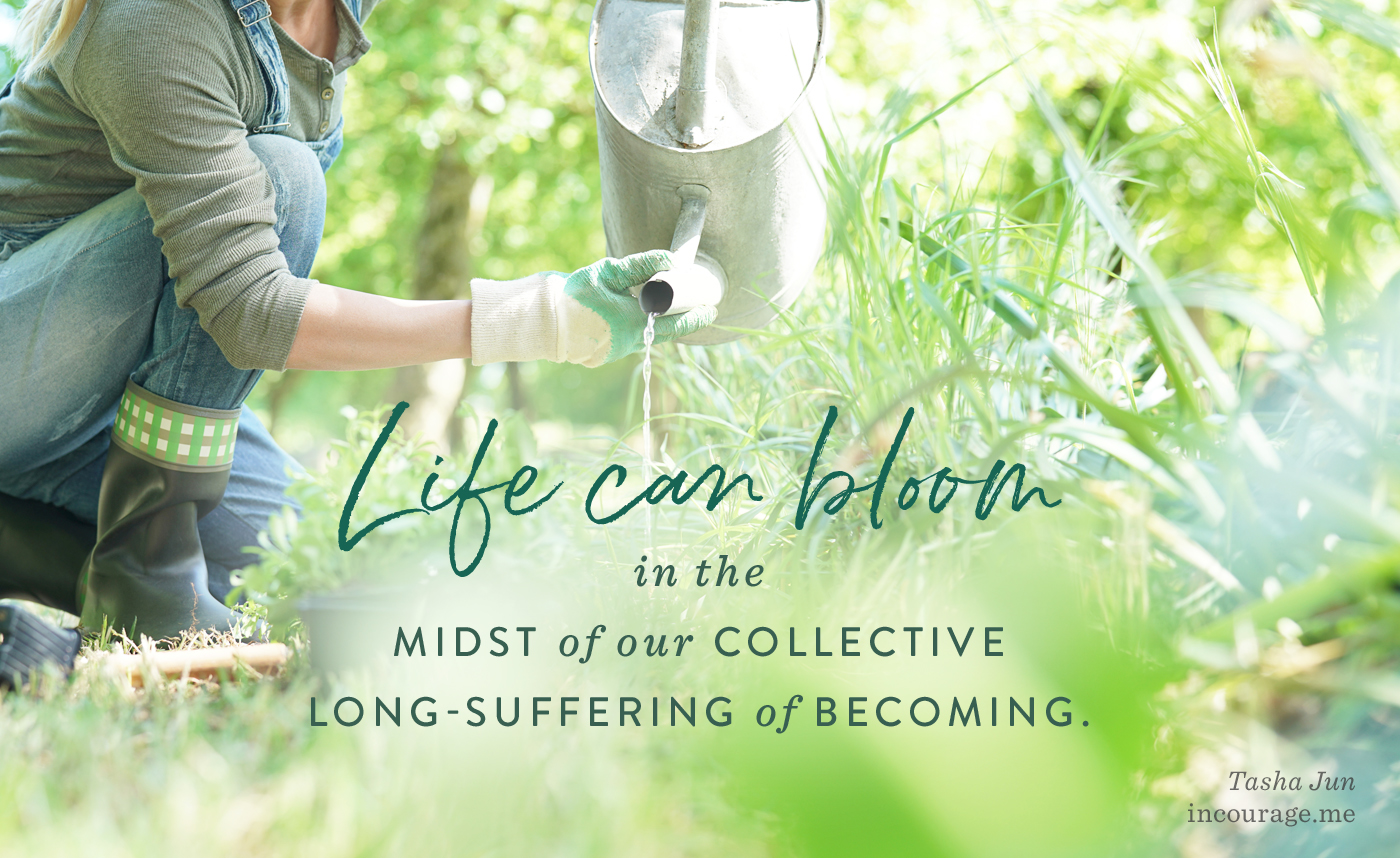Our family built a raised bed garden this spring. We talked about the idea of it for months prior, teeter-tottering between dreams and hesitations. In my daydreams, I imagined how it would serve as both a guide and needed distraction to some of the challenges we’ve been facing as a family.
But the truth that’s haunted this dream of a garden is that I’ve never been good with plants. I grew up with a mom who had the ability to converse with plants and animals and babies and a dad so tender and patient — all living things, from plants to pets to people, naturally leaned towards him when he was in the same room.
When my husband and I moved into our first home ten years ago, my mom gifted us with a houseplant. Given the plant-whispering parents I came from, I thought it would easily thrive. But I watered it sporadically, and some days I forgot it was there. I took its initially bright, green leaves and reserved nature for granted. And even with my lack of attention made obvious over time with its brown, shriveled leaves, I still expected it to stay alive. I believed the brokenness would turn. But it didn’t, and the plant died.
So, we got another plant. That one died too.
Here’s what I’ve learned about myself since those early days of plant care: I am an impatient, broken caregiver, and this cannot be avoided or bypassed quickly. Learning how to tend and care for growing things is a lifelong lesson of grace. It is an imperfect process. It takes time and for so long, I was resistant to and embarrassed by that process of time and the way my own need for tender care was linked to it.
Instead of taking to the process, I named myself a plant killer.
I joked about having a brown thumb and told people I couldn’t be trusted to keep any plant alive, even the ones that were supposed to require the least amount of care. I joked about it because it was true and because it was easier to joke about it than to keep trying and failing again.
I chose to name myself before I’d had a chance to stretch up towards the surface of soil I’d been placed in. I expected to be something before the Light had a chance to tenderly pull me into the process of becoming. So often, I still want to bypass the becoming altogether, forgetting that Jesus has a name for me that only He knows, one that’s inextricably linked to my becoming.
Sometimes, I still have trouble realizing that I am made to grow through failing and flailing, from soil mixed with loss and lament, and by coming face to face with my ever-present need, again and again. I thought I would be so many things by the time I reached this middle stage in life. But these days, my leaves look different than I ever expected they would.
I’ve checked on our little garden every day since we added it to the yard. The kids keep watching it as well, and they’ve each taken to their own ways of caring for it. Our oldest checks on it daily and goes to pick out everything that’s fallen into its square spaces with wind and rain, inspecting every sign of new growth or change. Our youngest chases bunnies away from it and looks for new flowers and bug visitors. Our middle guy worries about whether the leaves have had enough water and if they might be too cold. I talk to the plants, hoping for growth and fruit and life but better prepared to keep space for the unavoidable companions of joy and disappointment that accompany every growing thing.
It seems timely that we’ve planted hopes in a season that keeps bringing the reality of brokenness to our conversations and everyday life. I’ve been weighed down for weeks by the heartbreak of so many people I love near and far, by bad news, illness that’s stealing life from the fabric of my family tree, and disappointment as I witness the impatience and brokenness of care in the Church.
All of it begs me to look closely and ask myself if I am willing to let the people and things around me become: my family, my marriage, myself, my relationships, my gifts, my city, and my church. Will I let these things stretch and pull, break and shatter under the weight of weather and weeds, be pruned and transformed, and keep my own tenderness and need for it alive? I’m slowing learning the way life can bloom in the midst of our collective long-suffering of becoming.
Despite our brokenness, this backyard raised bed has become a family hope, a reminder of the kingdom of God here now and yet to come. And these days, I am not ashamed to say that I am desperate for the reminders.
[bctt tweet=”Life can bloom in the midst of our collective long-suffering of becoming. -@tashajunb:” username=”incourage”]
Leave a Comment






I am also the Grim Reaper of houseplants (I recently managed to decimate a cactus), and yet we have bountiful and flourishing vegetable and flower gardens, and I think the difference is that I am more intentional about the gardens. Like you, I stop seeing the houseplants, and they shrivel from the neglect.
It’s great that you and your family are working together in this raised bed! There’s nothing like a sun-warmed tomato in a tiny hand or the surprise of yanking a bright orange carrot out of nowhere! Enjoy!
Thanks, Michele!
Tasha,
What a nice idea! I was never a Gardner but grew many different vegetables from seedlings two summers ago and again well mostly lettuce and tomatoes this past summer. There is something reinvigorating to the spirit when you go and weed or water a living growing thing aside from the kids!! You are right that it is a distraction or a mindset shift from all else that’s going on in life. I hope your garden blossoms and that your whole family benefits from not just the plants/veggies but from the growing in your relationship as you tend the raised bed together. Nice post !
Thank you so much, Jas.
Hey there.. I’m all for bloom where you’re planted! God’s the Master Gardener and we are His seeds.. stay calm and “grow “ on! May you be fruitful today and rejoice in becoming:) blessings \0/
Thank you, Sadie!
I love your analogy and the reminder to not give up hope! All is not lost. God has a plan 🙂
Thank you, Kirsten!
Kirsten hey my family is broken need prayers . God has a plan it’s been a long road .
Just prayed for you, Maria.
Thank you. I really needed to hear this message today.
Thanks, Becky!!
Thank you so much for todays wonderful message. I have no kids. But in my time I was Registered Childminder for 19 years. Oh I did enjoy my job. Teaching the kids about Jesus throughout Psalty Kids Christian songs etc. They taugh me so much. About weeding like a garden. As they love making messing. They love being your little helper playing with sand growing plants etc especially if getting all the praise for it and when it comes to tyding up. It make me stop and think when we are in mess we can go Jesus for help. He will help us tide it up. So we can put the broken pieces back together because he is the gardener that see broken pieces in our lives. We are the plants. Jesus will help us grow again. To be strong again and get rid of all the weeds in our lives if we have any. Start all over again. Like me when I was a Childminder he will teach us to sing again and give him the praise. Like I remember teaching the kids I looked after to sing songs on to Jesus. Then we can thank him and months and months look back and say yes Jesus was there he help me through this that I was going through and helped me take out all thoes nasty weeds the Devil would want to stay there. Now I am a beautiful tall flower for Jesus again. Love Dawn xxx
Thanks for sharing that, Dawn. I’m sure you have many stories from those years. I’m glad you are here.
What an amazing post! I really needed this too!
Thanks, Erin! I’m so glad it resonated with you.
Tasha,
I am definitely a brown thumb. I had houseplants & could walk right by them several times daily & not realize they are there. I’m just not big on plants. Growing food is another thing. Perhaps I could be good at that. Watching things grow & then pruning them reminds me of John 15:1-17 where it talks about Jesus is the vine & His father is gardener. He cuts off every branch that does not bear fruit. Every branch bearing fruit gets pruned. God is like that with us. He will cut off anyone who doesn’t bear fruit. He carefully & skillfully prunes us to make us more like Himself. We are in a constant process of becoming what God wants for us. In the midst of our trials a little life can bloom. Flowers bloom in the cracks of sidewalks. It is the trials of life that make or break us. God is working to help them make us into a better Christian. Praying for you & your family in this tough season. I also pray that garden does well!
Blessings 🙂
Yes, I thought of God’s pruning a lot as I wrote this. Thanks so much for your prayers. That means a lot.
This is too funny. I have a brown thumb too. Both my momma/momma in law have such green thriving thumbs and I can’t even keep a cactus alive. Yes it is awful how we judge ourself and place these titles on us. Each and everyone of us is broken somewhere, somehow whether we want to admit it or not. The truth is despite our brokenness, God loves us and so we must love on others the same way. Let us encourage and lift up one another and build a culture of kindness and compassion. Thanks for sharing this.
Yes, let’s plant as many seeds of kindness and compassion that we can. I’m glad to know I’m not only the only brown thumb, and that there’s hope beyond the things I try to name myself!
Tasha, such a lovely blog post. I am terrible with plants as well. I even killed a lucky bamboo plant! My mother would always laugh about that. But your message also strikes a chore in my heart. There has been many issues that have been poking through the soil over the last 4 years since my Mom passed away,culminating with my Dad passing away one week ago. I’m trying to deal with all the emotions durning inside me. Things didn’t bloom the way I hoped or thought it would with our relationship. This has left me feeling like the withered plant leaf that’s currently on my windowsill. As I try to make it through another grief journey, I’m taking your inspiring words with me. Thank you for reminding me that with the Lord’s help, all the pungent memories and events in my life becomes the perfect fertilizer- of hope,faith, and love in a garden that will always bloom in its own time. ❤
Oh Kathleen, I’m so very sorry for your loss! 🙁 My heart is heavy for you. I’m praying for you right now, and I will continue to do so as you come to mind.
Thank you so very much. I really appreciate and need the prayers. You are in mine as well. <3